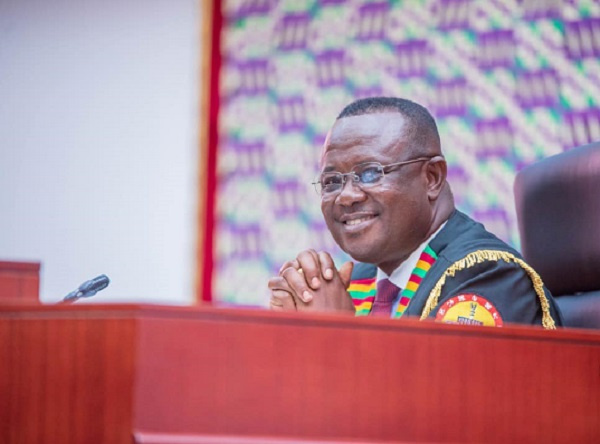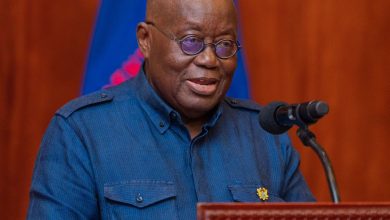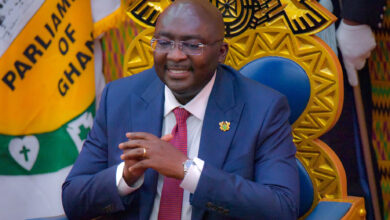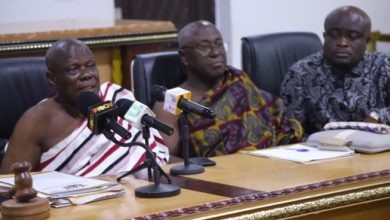Majority reverses Minority decision – approves 2022 Budget

Parliament on Tuesday, November 30, 2021, voted in favour of the 2022 Budget Statement and Economic Policy of the government, overturning the earlier rejection of the budget by the House last Friday.
The approval of the budget was undertaken by the 138 members of the Majority, including the First Deputy Speaker, Mr Joseph Osei-Owusu, who presided over proceedings.
The Minority members, who had voted against the budget last Friday, were not in the Chamber of the House to take part in proceedings leading to the approval of the budget.
Long caucus meetings
Before proceedings started, both the Majority and the Minority sides were locked up in caucus meetings with their leadership, which started just around 10 a.m.
Proceedings in the House started at 4 p.m., but without the Minority side of the House.
They did not show up in the Chamber until their Majority counterparts had approved the budget.
That doused the highly anticipated heated debate in the House.
Journalists from a multiplicity of media houses stood ready to follow proceedings but had to wait on end.
The public galleries equally had a number of observers who were there to see things for themselves.
Appropriate numbers
Mr Osei-Owusu called the House to order and quoted Order 109 (1) and Article 104 (1) of the 1992 Constitution to justify that the House had a quorum, the required number of members in the Chamber, and, therefore, it stood ready to take a decision.
Article 104 (1) of the Constitution says: “Except otherwise provided in this Constitution, matters in Parliament shall be determined by the votes of majority members present and voting with at least half of all members present.”
“What this means is that before you take a decision, there must be at least majority of all members present; with me, we are 138 members and that is the majority.
“It does not mean that all the 138 members must vote yes or no; the decision of majority of this 138 members will carry,” the First Deputy Speaker declared.
He also said under Order 109 (1): “No question for a decision in the House shall be proposed for determination unless there are present in the House not less than one-half of all members of the House, and except otherwise provided in the Constitution, the question proposed shall be determined by majority of votes of members present and voting.”
Reversal
The reversal of the earlier vote against the budget came after the Majority Leader, Mr Osei Kyei-Mensah-Bonsu, had moved a motion for the Speaker to reverse that decision because the Minority did not have the required number to take a decision for the House.
With the motion seconded by the Deputy Majority Leader, Mr Alexander Afenyo-Markin, the Speaker put the questions on the motion for a vote.
Counting
Prior to putting the motion to a vote, Mr Osei-Owusu wanted to be certain of the number of members present in the Chamber and, therefore, directed the clerks to count the members.
“The result given to me by Clerks at Table is 137 of you, plus me, the MP for Bekwai, 138,” he announced.
He said per the Vote and Proceedings at the time the question was put on the motion for the House to approve the budget last Friday, the number of MPs in the House was less than half of MPs.
“Clearly, the record shows that 137 MPs were present, and that number was less than 50 per cent of all MPs,” he said.
He then put a question to rescind the House’s earlier decision, which had an overwhelming uproar from the one-sided House.
After that, the Speaker put a question on a motion for the House to approve the budget, which received an equally overwhelming “yeah”! reponse.
Speaker erred
According to the MP for Bekwai, Article 104 (1) and Standing Order 109 (1), which regulated the process of decision-making in the House, required that a question shall not be put on any matter for decision to be made unless half of all the members were present in the Chamber.
He said the Speaker, in putting the question on the motion to approve the budget last Friday, ought to have averted his mind to that constitutional and procedural requirement.
“I am certain in my mind that given his wide varied experience and expertise in Parliament, he would not have fallen into this error if his attention had been drawn to this constitutional requirement.
“The consequence, though, is that the putting of the question on the motion on the Budget Statement and Economic Policy was done in violation of Article 104 (1) of the 1992 Constitution and, therefore, is void and inconsequential,” he said.
“As the record shows, 137 members were in the Chamber; subsequently, the vote and declaration that the budget statement was rejected are also hereby declared of no effect,” he added.
Why Minority boycotted sitting
Addressing concerns as to why the Minority boycotted today’s sitting, Mr Osei-Owusu told the House that leadership of both sides did agree at a meeting in the morning that sitting would begin at 3.30 p.m.
“It is a pity that nobody is here so I could hear their views on the motion before me,” he lamented the absence of the Minority in the House.
Prior to the vote being taken, the First Deputy Speaker directed all non-members of Parliament, including the Attorney-General and Minister of Justice, Mr Godfred Yeboah Dame; the Minister of Food and Agriculture, Dr Owusu Afriyie Akoto, and the National Security Minister, Mr Albert Kan-Dapaah, to leave the Chamber and move to the gallery to allow for clear counting.
Acid test
Ahead of the approval of the budget, the Majority Leader, Mr Osei Kyei-Mensah-Bonsu, had reiterated the fact that the rejection of the budget by the 137 members of the Minority last Friday was unconstitutional.
He said the rejection of the budget was not in accord with the practice of the House, since an appropriate number of MPs were required to either accept or reject the budget.
“We have 137 registering as being present and voting, and that number cannot support or reject the budget document, as the number that was relied on to reject the vote did not meet the acid test of the Constitution,” he said.
Powers of Speaker
Dwelling on why the First Deputy Speaker had the capacity to determine the rejection of the budget by the Minority, the Deputy Majority Leader, Mr Alexander Afenyo-Markin, cited Order 13 (2) to justify that the First Deputy Speaker was “so fortified to consider the matter”.
Order 13 (2) says: “Whenever the House is informed by the Clerk at Table of the unavoidable absence of Mr Speaker, the First Deputy Speaker shall perform duties and exercise the authority of Mr Speaker in relation to all
proceedings of the House until Mr Speaker resumes the chair without any further communication to the House.”
In line with that order, Mr Afenyo-Markin said, the Clerk at Table informed the House that the Speaker of Parliament, Mr Alban Bagbin, was unavoidably absent, and “by that imperative, you are well fortified to assume the full duties, mandate, power, responsibilities as though you are the Speaker of the House”.





